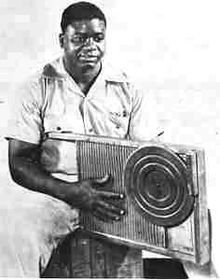
Robert Clifford Brown (July 15, 1910 – November 6, 1966), known professionally as Washboard Sam, was an American blues musician and singer. [....] He was reputedly the half-brother of Big Bill Broonzy. He moved to Memphis, Tennessee, in the 1920s, performing as a street musician with Sleepy John Estes and Hammie Nixon. He moved to Chicago in 1932, performing regularly with Broonzy and other musicians, including Memphis Slim and Tampa Red on many recording sessions for Lester Melrose of Bluebird Records.
In 1935, he began recording in his own right for both Bluebird and Vocalion Records, becoming one of the most popular Chicago blues performers of the late 1930s and 1940s, selling numerous records and playing to packed audiences. He recorded over 160 tracks in those decades. [...] By the 1950s, his audience had begun to shrink, largely because he had difficulty adapting to the new electric blues. His final recording session, for RCA Victor, was in 1949. [...]. Brown made a modest and short-lived comeback as a live performer in the early 1960s. (Read more at Wikipedia)
Links to Peel

Washboard Sam- Diggin' My Potatoes
The young John Ravenscroft was a collector of blues LPs and it was this enthusiasm which got him his first radio job in the early 1960s, on the Kat's Karavan show on station WRR in Dallas, Texas. As Peel recalled on the show of 07 October 1986 when playing a track by Washboard Sam, the first record he ever played on the radio was by the artist - a familiar name to blues record collectors like himself, but not one of the best-known bluesmen. In Margrave of the Marshes (hardback edition, pp. 150-1) he relates that when he first visited WRR, he took with him Lightnin' Hopkins' UK release The Rooster Crowed In England, together with "a bunch of French 10" LP releases by artists such as Big Maceo, Washboard Sam and Jazz Gillum." The hosts of Kat's Karavan were impressed enough by these rare albums to offer Peel/Ravenscroft a regular spot on the programme.
The blues collectors of the 1960s tended to favour older, more obscure rural blues singers from the 1920s and 1930s over those Chicago-based artists, like Washboard Sam and the others mentioned above, who were highly popular with black record-buyers in the pre-war era and performed in a light-hearted "hokum blues" style.. Nevertheless some of Sam's hits were covered by other artists, like "Diggin' My Potatoes" , which was later recorded by Peel hero Lonnie Donegan and became a skiffle favourite. The DJ didn't feature any Washboard Sam tracks on his shows until the 1970s, which may have been because he left behind LPs by the bluesman, together with the rest of his collection, when he left the USA in 1967; it was eventually shipped over to him two years later.
Festive Fifty Entries
- None
Sessions
- None
Other Shows Played
- 02 June 1972: Minding My Own Business (4xLP – Genesis: The Beginnings Of Rock) Chess
- 10 July 1982: Mountain Blues (One of the records Peel played on his radio debut in 1961)
- 07 October 1986: I'm Gonna Keep My Hair Parted (10" - Washboard Sam) RCA (Peel says the very first records he played on the radio was from Washboard Sam.)
- 24 August 1999: She Belongs To The Devil (Peelenium 1941)
- 03 January 2001: Evil Blues (78) Bluebird (Pig's Big 78)
- Other
- Peeling Back The Years 2 (Transcript): I'm Feeling Low Down (Bluebird) (JP: I went down there and I’d got these records that I’d bought in Holland, or bought from Holland, although they were French – the sleeve notes were in French – and they were records drawn from the Bluebird record catalogue. Now Bluebird Records was a label which I think was affiliated with RCA. It was their kind of race record label, and the music on Bluebird was linked, the kind of solo acoustic guitar player or piano player, with the electric Chicago bands of a few years afterwards. So it was mainly acoustic stuff, but mainly little groups.)